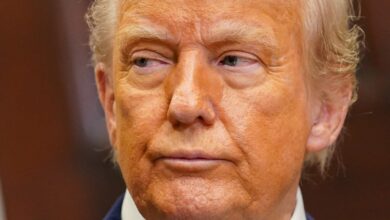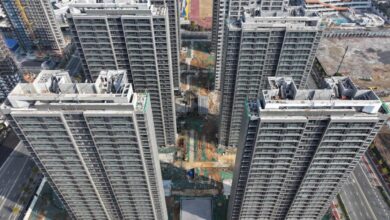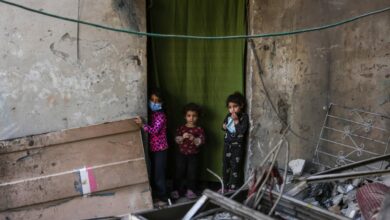Pakistan expresses solidarity with people of Bangladesh, hopes for ‘peaceful return to normalcy’ – World

Pakistan on Wednesday expressed solidarity with the people of Bangladesh and hoped for a “peaceful and swift return to normalcy” after deadly protests led to the end of former prime minister Sheikh Hasina’s rule two days ago.
The statement comes as a caretaker government is expected to be formed under the leadership of Nobel laureate Muhammad Yunus after student protest leaders asked him to do so.
The movement that toppled Hasina rose out of protests against public sector job quotas for families of veterans of Bangladesh’s 1971 independence war, seen by critics as a means to reserve jobs for allies of the ruling Awami League party.
“The government and people of Pakistan stand in solidarity with the people of Bangladesh, sincerely hoping for a peaceful and swift return to normalcy,” the Foreign Office (FO) said in a statement.
“We are confident that the resilient spirit and unity of the Bangladeshi people will lead them towards a harmonious future,” it added.
More than 400 people have died since July as security forces sought to quell the unrest but the protests grew and Hasina finally resigned and fled aboard a helicopter on Monday after the military turned against her.
Hasina flew to India and is staying at a safe house outside New Delhi.
Bangladesh’s army chief General Wakeruz Zaman announced on Monday that the military would form an interim government, saying it was “time to stop the violence”.
The next day, President Mohammed Shahabuddin dissolved parliament — a key demand of the student leaders and the major opposition Bangladesh National Party (BNP), which has demanded elections within three months.
Hasina’s arch-rival, BNP chairperson and former prime minister Begum Khaleda Zia, was also freed from years of house arrest.
Financial Times on Wednesday that he was not seeking an elected role or appointment beyond the interim period.
“It is critical that trust in government be restored quickly,” the Nobel winner said.
“We need calm, we need a road map to new elections and we need to get to work to prepare for new leadership,” Yunus told the newspaper.
President Shahabuddin has also recommended that a veteran of the war should be nominated to the interim government.
Nahid Islam, one of the main leaders of the student movement, told reporters after the president’s announcement that students have recommended 10-15 members for the interim government in an initial list they shared with the president.
Islam said he expects interim government members to be finalised in 24 hours starting from late Tuesday evening. The students’ recommendations for the government include civil society members and also student representatives, Islam said.
Separately, hundreds of people gathered at a rally in Dhaka by the main opposition BNP, whose leader and former Prime Minister Khaleda Zia, 78, was freed from house arrest by the president on Tuesday.
Zia had feuded and alternated power with rival Hasina, 76, since the early 1990s and she was convicted for graft in 2018 but called the charges politically motivated.
Key political leader Tarique Rahman, acting president of the former opposition Bangladesh National Party, spoke via video broadcast to a giant rally of supporters in Dhaka.
Rahman, who went into exile in London during Hasina’s rule, urged for elections to be swiftly held.
“The vote should be held as quickly as possible,” Rahman said, also urging calm. Since Hasina fled, police reported mobs launching revenge attacks on her allies.
“Don’t take laws into your hands”, he told BNP supporters.
Normalcy slowly began returning after Monday’s chaos but protests broke at the headquarters of the Bangladesh Bank in Dhaka on Wednesday when hundreds of officials from the central bank forced four of its deputy governors to resign over alleged corruption, two sources at the bank said.
The bank did not immediately comment.
Most schools and university campuses in Dhaka and other cities that shut in mid-July due to the protests, reopened while people took buses and other transport to offices and banks. The garment factories that had been shut for days also began opening on Wednesday.
reported quoting sources.
India also said what was “particularly worrying was that minorities, their businesses, and temples also came under attack at multiple locations”.
Chaotic violence on Monday had seen more than 100 people killed — the deadliest day since protests began in early July.
A further 10 people were killed on Tuesday, taking the total death toll of the protests to at least 432, according to an AFP tally based on police, government officials, and doctors at hospitals.
The Bangladesh Hindu Buddhist Christian Unity Council (BHBCUC) has said 200-300 mainly Hindu homes and businesses have been vandalised since Monday, and 15-20 Hindu temples were damaged.
The student leaders also said that they had received reports of attacks on minority groups, including Hindu temples, in the Muslim-majority country, and urged restraint as this could undermine their movement.
UN Secretary-General Antonio Guterres had stressed the importance of a “peaceful, orderly and democratic transition”, his spokesman said.
European Union foreign policy chief Josep Borrell echoed that call. Similarly, former colonial ruler Britain, along with the United States, had urged “calm”.
Source link



